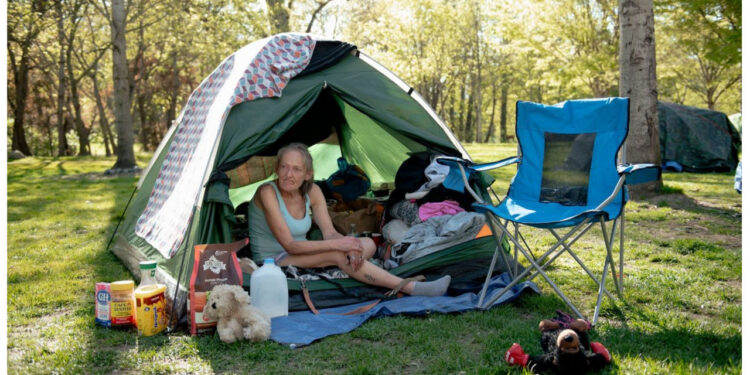The Supreme Court is currently discussing the extent to which cities can take measures to address public sleeping without inadvertently criminalizing homelessness. This issue has become increasingly significant due to the rising number of Americans without shelter, reaching record levels.
In 2018, the Supreme Court allowed a ruling by a California-based appeals court to stand. The ruling stated that an anti-camping ordinance in Boise, Idaho, could not be enforced against homeless individuals if the city did not have enough shelters available.
The Supreme Court agreed to hear the city’s appeal when it was used to declare that similar bans in Grants Pass, Oregon amounted to cruel and unusual punishment.
Grants Pass officials argue that their anti-camping punishments, which begin with fines of $295 and can escalate to jail sentences for repeat offenses, are not cruel or unusual in the traditional sense. They assert that these measures are necessary to combat the persistent issue of homeless encampments overtaking parks and sidewalks, a problem that has plagued many cities since the initial ruling in 2018.
According to the city’s attorneys, encampments in the Western region have been rapidly increasing due to the lack of effective restrictions on public camping. This has led to a surge in violent crime, drug overdoses, disease outbreaks, fires, and hazardous waste. The attorneys argued this in a legal brief in preparation for Monday’s oral arguments.
Advocates: housing crisis won’t be solved by punishment
Advocates for the homeless, who are appealing the limitations, claim they are so broad that it is impossible for someone without access to shelter to reside in Grants Pass without fearing penalty. The city of approximately 38,000 in southern Oregon lacks affordable homes. There is no homeless shelter for adults. As a result, hundreds of individuals are without a place to sleep.
They include Gloria Johnson, one of the people who sued, who said Grants Pass police regularly woke her up while she was sleeping in her van and threatened her with a fine if she did not leave.
Jesse Rabinowitz, the campaign and communications director for the National Homeless Law Center, stated that incarcerating more people will not solve America’s affordable housing crisis. “This is true in Grants Pass, and this is true across the country.”
Advocates argue that the true goal of such restrictions is to force those who have nowhere to stay out of the city, making them someone else’s responsibility and potentially leading to a countrywide prohibition on homelessness if other communities follow suit.
Officials across political spectrum want clarity
Government officials from various jurisdictions are seeking clarification from the Supreme Court regarding their powers and limitations. This includes officials from Grants Pass, as well as individuals from different political backgrounds.
California, with its high population of individuals experiencing homelessness, has become a focal point for addressing this pressing issue. In fact, the state is home to almost one-third of the nation’s homeless population, with nearly half of them lacking proper shelter.
California Governor Gavin Newsom expressed frustration over the lower courts’ decisions to prevent the clearing of encampments and their strict oversight on determining what constitutes an acceptable offer of shelter.
According to the federal government, there are more than 600,000 people likely to be homeless on any given night in the United States. In the previous year, 40% of homeless individuals found themselves sleeping under bridges, on sidewalks, in parks, cars, abandoned buildings, and other public locations.
Court has said behavior, not status, can be criminalized
The challenge to Grants Pass’ rules represents the most significant case on homelessness in decades.
In 1962, the Supreme Court made a significant ruling regarding drug addiction in California. The decision clarified that while individuals could be arrested for the act of using illegal drugs, they could not be arrested solely for being addicted to them. This distinction emphasized that drug addiction should be treated as a status rather than a criminal behavior.
The 9th Circuit Court of Appeals, located in California, has determined that the same argument applies to both Boise and Grants Pass. According to the court, if individuals are forced into homelessness because there are no shelter beds available, then the camping bans are targeting their status rather than their behavior.
According to officials from Grants Pass and other cities, the current framework is unworkable.
People often wonder when someone can be considered “involuntarily” homeless. For instance, what happens if someone refuses to go to a shelter because it doesn’t allow pets? Or if they are forced to leave a shelter due to their behavior? Additionally, cities face the challenge of accurately calculating the number of shelter beds available versus the number of homeless individuals each night. This is crucial in determining whether there are enough vacancies for someone to be penalized for sleeping in a park.
Biden administration weighs in
The outcome of the case is of interest to the federal government as well. Being the largest property owner in the country, the government has a vested interest in maintaining the cleanliness and safety of public parks and other spaces, as conveyed by the Justice Department to the Supreme Court. As an example, when camping activities on the National Mall and in the park opposite the White House caused damage, the National Park Service implemented restrictions in 1982.
The Biden administration concurs with the 9th Circuit Court of Appeals, acknowledging that individuals without alternative options cannot be entirely excluded from public spaces. However, the Justice Department has informed the Supreme Court that the application of this principle should be contingent upon an assessment of an individual’s unique circumstances. The appeals court has not provided guidance on how to determine if someone is “involuntarily homeless.” Merely establishing that there is a scarcity of shelter beds is insufficient, according to the Justice Department.
The decision is anticipated to be made by the end of June.










